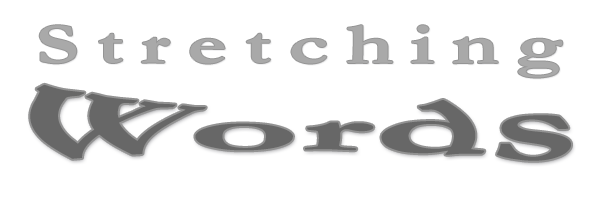“The waves lapped the sandy shore. Overhead, the stars twinkled cheerily. A bank of clouds rolled in and a driving rain chased us from the beach. We were both huffing and puffing by the time we reached the quaint little cottage we had rented. It was pitch dark inside. We found some candles and had our dinner by the flickering light.”
Well, that wasn’t interesting at all, was it?

Words can only be stretched so far before they break.
Words have meanings and certain words lend themselves all to well to particular situations. They get overused and the meaning all but wrung dry from them. They cease becoming convenient ways to characterize the ocean, the sky, the darkness, and instead become expected forms. At best, you’ve given the reader something they gloss over but leave the proper image in their mind. It’s likely though that they skim over it without garnering any meaning at all: “‘The waves … … … … shore.’, got it, they’re on a beach”. The worst case is that the reader reads the cliched text, rolls their eyes, and marks you down a notch in their estimation.
The Trap
The temptation to use cliches is the very reason of their existence: they have become too perfect a way to describe something. Look back far enough and Shakespeare, Chaucer, or Thoreau came up with some brilliant imagery or a unique turn of phrase that has wormed its way into everyday use centuries later. They set a standard. Through humility or lack of creativity, many people take those time-honored descriptions and apply them in their own writing. It seems like the right thing to do to paint the desired picture in the reader’s mind.
The Writer Who Cried Wolf
Read that introductory paragraph again. Look for the descriptors used. How many of those actually made an impression as you read them? To be sure, you knew that the waves were mild and the stars were out. You knew a heavy rain came and they ran. They got inside and lit candles because it was dark. What you probably never got was a taste of what any of that felt like. It was all boilerplate, standard-issue prose.
Like the boy who cried wolf, you have heard it all too many times to make the mental effort to imagine that same weary old imagery yet again.
One-Word Metaphors
The solution involves creativity and work. There’s no easy answer. You may write passages like the example above without giving it any thought – the same way the reader will read it. The way to fix a passage like the example are what I call one-word metaphors. You aren’t painting an elaborate picture for the reader, you’re substituting a tired, cliched word for a new one that conveys the tone you want.
Cliche: The waves lapped the sandy shore.
Fixed: Waves tickled the tide line. (there’s no reason not to use better words and fewer articles when they are not needed)
Cliche: Overhead, the stars twinkled cheerily.
Fixed: They were spotlit by a billion stars.
Cliche: a driving rain chased us from the beach
Fixed: we fled before the stampeding rain.
Let’s rewrite the initial passage again with the replacement words and a bit of clean-up to fix everything in context:
Waves tickled the tide line as we strolled the length of the beach, spotlit by a billion stars. Unknown to us, dark clouds crept across the sky behind our backs. When the storm sprang its trap, we fled before the stampeding rain and took shelter in our rented cottage. Without power, we scrounged up a pair of candles and dined by their intimate light.
OK, this still isn’t a great story but at least we have ironed out the prose a bit. It’s good to note that the modifier for the cottage was omitted as unnecessary (and boring) and that the quality of the darkness (which is probably wasted in a non-horror work) is replaced by its reason. Read through some of your own works with a critical eye toward what each modifier and descriptor is adding and whether it’s cliched. Then start thinking about one-word metaphors you might replace them with.

Liking the new format!